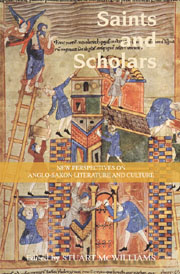 Saints and Scholars
Saints and Scholars Book contents
- Frontmatter
- Contents
- List of Contributors
- Abbreviations
- Introduction
- I Hagiography and the Homiletic Tradition
- II Aspects of Community and Consumption
- III Reflections on Old English Scholarship
- 15 Old English for Non-Specialists in the Nineteenth Century: A Road Not Taken
- 16 The Beginnings of English Poetry: Philological and Textual Challenges for the Creative Imagination
- Poems
- Hugh Magennis: A Bibliography, 1981–2011
- Index
- Tabula Gratulatoria
15 - Old English for Non-Specialists in the Nineteenth Century: A Road Not Taken
from III - Reflections on Old English Scholarship
Published online by Cambridge University Press: 05 February 2013
- Frontmatter
- Contents
- List of Contributors
- Abbreviations
- Introduction
- I Hagiography and the Homiletic Tradition
- II Aspects of Community and Consumption
- III Reflections on Old English Scholarship
- 15 Old English for Non-Specialists in the Nineteenth Century: A Road Not Taken
- 16 The Beginnings of English Poetry: Philological and Textual Challenges for the Creative Imagination
- Poems
- Hugh Magennis: A Bibliography, 1981–2011
- Index
- Tabula Gratulatoria
Summary
While histories of the discipline of Anglo-Saxon studies have served us well in presenting a record of the progress of Anglo-Saxon scholarship, detailing philological, palaeographical and editorial advances made from the Reformation until the present day, the teaching of Anglo-Saxon studies is still a relatively neglected aspect of the history of the discipline. This is partly because only scarce evidence survives from universities in terms of syllabi, set texts, examination questions and so on from before the twentieth century (future historians of the discipline will enjoy an embarrassment of riches with all the paperwork detailing learning outcomes and lesson plans which the recent audit culture has produced). Often, almost the only information available for how Old English was taught at universities in this period is a note of the texts to be used. For the Oxford School of English, for example, established only as late as 1896, they were, unsurprisingly, Sweet's Anglo-Saxon Reader, and Beowulf, probably studied in A. J. Wyatt's edition of two years earlier. In comparison, the volume of paperwork related to teaching Old English at Oxford which survives from just three decades later is sufficient to reconstruct Auden's apprenticeship to the subject in some detail.
It is not merely, however, for lack of evidence that histories of teaching Old English and Anglo-Saxon are eclipsed by histories of scholarship; the latter can more easily be fashioned into narratives of progress that endorse the activities of those writing them, whereas a history of teaching the subject might need to accommodate perceived regression and losses, as well as advances and gains.
- Type
- Chapter
- Information
- Saints and ScholarsNew Perspectives on Anglo-Saxon Literature and Culture in Honour of Hugh Magennis, pp. 234 - 251Publisher: Boydell & BrewerPrint publication year: 2012


